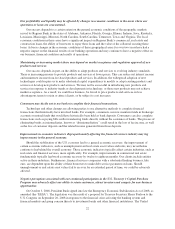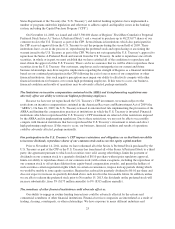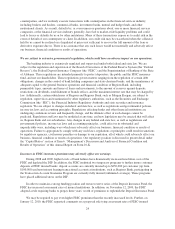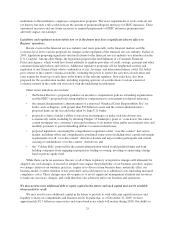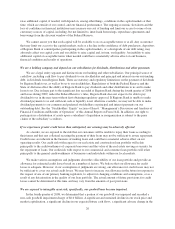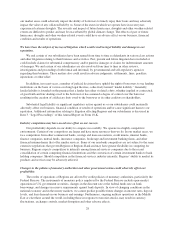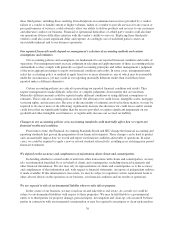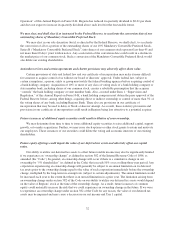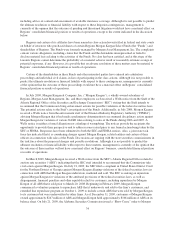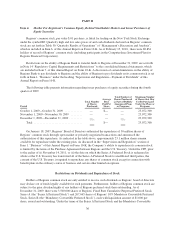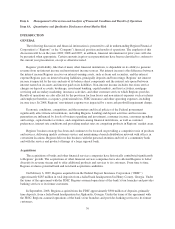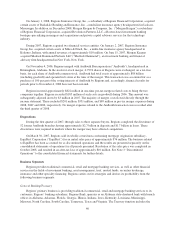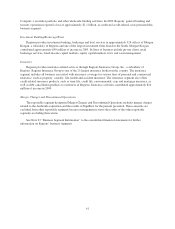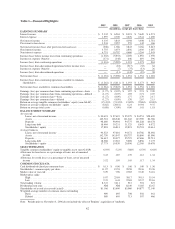Regions Bank 2009 Annual Report Download - page 46
Download and view the complete annual report
Please find page 46 of the 2009 Regions Bank annual report below. You can navigate through the pages in the report by either clicking on the pages listed below, or by using the keyword search tool below to find specific information within the annual report.Operation” of this Annual Report on Form 10-K. Regions has reduced its quarterly dividend to $0.01 per share
and does not expect to increase its quarterly dividend above such level for the foreseeable future.
We may elect, and shall elect if so instructed by the Federal Reserve, to accelerate the conversion date of our
outstanding shares of Mandatory Convertible Preferred Stock.
We may elect in our sole discretion (but if so directed by the Federal Reserve, we shall elect), to accelerate
the conversion of all or a portion of the outstanding shares of our 10% Mandatory Convertible Preferred Stock,
Series B (“Mandatory Convertible Preferred Stock”) into shares of our common stock upon not less than 45 and
not more than 60 days’ prior written notice. Any acceleration of the conversion date could result in a decline in
the market price of our common stock. Such a conversion of the Mandatory Convertible Preferred Stock would
also dilute our existing shareholders.
Anti-takeover laws and certain agreements and charter provisions may adversely affect share value.
Certain provisions of state and federal law and our certificate of incorporation may make it more difficult
for someone to acquire control of us without our board of directors’ approval. Under federal law, subject to
certain exemptions, a person, entity or group must notify the federal banking agencies before acquiring control of
a bank holding company. Acquisition of 10% or more of any class of voting stock of a bank holding company or
state member bank, including shares of our common stock, creates a rebuttable presumption that the acquirer
“controls” the bank holding company or state member bank. Also, as noted under Item 1. “Supervision and
Regulation,” of this Annual Report on Form 10-K, a bank holding company must obtain the prior approval of the
Federal Reserve before, among other things, acquiring direct or indirect ownership or control of more than 5% of
the voting shares of any bank, including Regions Bank. There also are provisions in our certificate of
incorporation that may be used to delay or block a takeover attempt. As a result, these statutory provisions and
provisions in our certificate of incorporation could result in Regions being less attractive to a potential acquirer.
Future issuances of additional equity securities could result in dilution of your ownership.
We may determine from time to time to issue additional equity securities to raise additional capital, support
growth, or to make acquisitions. Further, we may issue stock options or other stock grants to retain and motivate
our employees. These issuances of our securities could dilute the voting and economic interests of our existing
shareholders.
Future equity offerings could impair the value of our deferred tax assets and adversely affect our capital
ratios.
Our ability to utilize our deferred tax assets to offset future taxable income may also be significantly limited
if we experience an “ownership change” as defined in section 382 of the Internal Revenue Code of 1986, as
amended (the “Code”). In general, an ownership change will occur if there is a cumulative change in our
ownership by “5% shareholders” (as defined in the Code) that exceeds 50% over a rolling three-year period. Any
corporation experiencing an ownership change will generally be subject to an annual limitation on its deferred
tax assets prior to the ownership change equal to the value of such corporation immediately before the ownership
change, multiplied by the long-term tax-exempt rate (subject to certain adjustments). The annual limitation would
be increased each year to the extent that there is an unused limitation in a prior year. The limitation arising from
an ownership change under section 382 of the Code on our ability to utilize our deferred tax assets would depend
on the value of Regions’ stock at the time of the ownership change. As a result, future issuances of common
equity could materially increase the risk that we could experience an ownership change in the future. If we were
to experience an ownership change under section 382 of the Code for any reason, the value of our deferred tax
assets may be impaired and may cause a decrease in our net income and Tier 1 capital.
32


